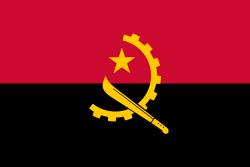| Angola at the 2021 Summer World University Games | |
|---|---|
 | |
| IOC code | ANG |
| in Chengdu, China 28 July 2023 – 8 August 2023 | |
| Competitors | 2 (1 man and 1 woman) |
| Medals |
|
| Summer World University Games appearances | |
Angola competed at the 2021 Summer World University Games in Chengdu, China held from 28 July to 8 August 2023. [1]